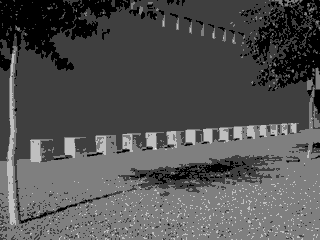
- 16 October 2000
- Subtle Irregularities in Fifteen Cement Cubes Leading to the Entrance of the Santa Fe Art Institute Exposed by Their Shadows in Fifteen Photographs Made from 15:29 to 15:31 on 14 October 2000
- I spent the last two days helping Monika, a lovely German artist I met here in Santa Fe, hang her please-don’t-deport-me show. Monika, who escaped from East Germany when there was such a thing, is here on an artist visa which is about to run out. In order to have a chance at staying here, American bureaucrats need to be convinced she’s bringing substantial assets with her. The situation is ridiculous and depressing.
When I was visiting her at her studio at the Santa Fe Art Institute, I noticed the fifteen perfect cubes leading to the institute’s main entrance weren’t really perfect at all. The subtle irregularities were the catalyst for yet another boring more-or-less conceptual piece, Subtle Irregularities in Fifteen Cement Cubes Leading to the Entrance of the Santa Fe Art Institute Exposed by Their Shadows in Fifteen Photographs Made from 15:29 to 15:31 on 14 October 2000. As is the case with such pieces, this work should be viewed in its PDF manifestation.

- 17 October 2000
- An Inappropriate Solution to a Romantic Quandary
- A dear friend, who shall remain anonymous for the usual reasons, confided that she was in something of a perplexing romantic situation. The details are no one’s business except for the (only!) two people involved. My solution, however, is universally efficacious.
Or so I thought.
“Here’s what you need to do,” I advised. “Go home, and drink one bottle—or preferably two bottles—of not-too-expensive red wine. Listen to Derek and the Dominoes ask the musical question, ‘Why Does Love Have to be So Sad?,’ over and over again until some of the malaise lifts.”
My dear friend thanked me sincerely for my counsel, then confided that she was unable to consume more than half a glass of wine before the nectar of the grape rendered her less than useless.
There’s nothing Derek, Dionysus and I can do but to watch our dear friend suffer silently without the benefit of any anesthesia.

- 18 October 2000
- Casu Marzu
- It seems that everyone likes crazy stories about wacky foreigners, and the silly money-grubbers at the Wall Street Journal are no exception. I just read a dispatch from Nuoro, Sardinia, that described a local delicacy, “casu marzu,” or “rotten cheese.”
But not just any rotten cheese.
The cheese in question is made from sheeps’ milk, and more. In this case, the “more” consists of maggots, and lots of ’em. The reporter describes how the “wiggling worms (often) jump straight toward the eyes with ballistic precision.”
But what about the taste?
The Italian government has banned the cheese, so I will have to rely on the journalist’s description that the black market sample was a “viscous, pungent goo that burns the tongue.” According to the report, consumers of the illicit cheese believe the maggots are a sign of quality, and dispose of the cheese when the worms die. (That sounds quite sensible; I wouldn’t eat any cheese that couldn’t sustain a maggot.)
I think the reporter failed to ask the most important question in any Italian cuisine story: “What does casu marzu taste like with red wine?” Such shoddy journalism is but one of the myriad reasons that I never read the Wall Street Journal.

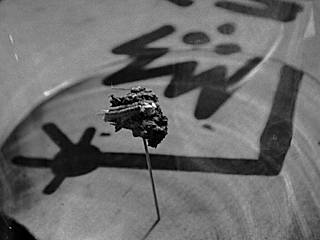
- 19 October 2000
- Asteroconius clytocampa
- I generally don’t understand why people collect things. In particular, I do not know why Edwin collects butterflies, but he does. What does Edwin see in a plague of winged insects impaled on straight pins? I still have no idea, despite his long and tedious presentation.
I was most unimpressed with his most valuable specimen, a chunk of the extraordinarily rare Asteroconius clytocampa. (Edwin extolled, at length, the virtues of the almost extinct butterfly, which is found only in the mountains of Cameroon. He paid for expensive DNA tests to confirm that the bit of organic matter really was Asteroconius clytocampa. But even Edwin admits there’s not much to see, just a small part of the butterfly’s body.)
“You don’t see a critter like that every day,” I said with feeble praise.
Edwin didn’t notice my lack of enthusiasm, he was off somewhere with butterflies on the brain.

- 20 October 2000
- Dining with Susan
- I enjoy dining with Susan, even if it does mean a limited number of menu options. Many of my friends limit their diets because of health, environmental, or ethical considerations, but Susan’s choice of restaurants depends on simple marketing concerns.
Here’s how it works. Susan doesn’t have much money. Susan likes to dine in restaurants. Susan doesn’t like to let anyone treat her to dinner, lest she feel beholden to them. So what’s a gal to do?
Susan’s solution is to collect coupons from restaurants that offer two meals for the price of one. I buy my dinner, then she eats hers for free. I suppose it’s a strange relationship, but then what other kinds are there?

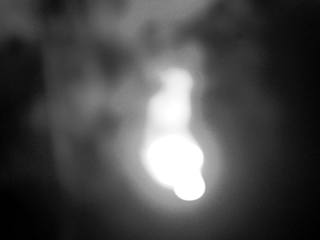
- 21 October 2000
- A Major Model Rocket Safety Code Violation
- Duggan laughed after reading my recent notebook entry regarding a potential violation of the Model Rocket Safety Code.
“That ain’t nothing,” he boasted. “Come out in the field and I’ll show you some bigtime mayhem.”
We grabbed a couple more beers, a mobile launch pad, and the largest model rocket I’d ever seen. It was over a meter long, and as thick as a serious cucumber.
“Don’t forget your camera,” Duggan suggested.
“I don’t think I’ll need it,” I replied. “It’s dark, and I generally dislike strobes.”
Duggan insisted that I bring my camera and a telephoto lens, and claimed that there would be “plenty of existing light.” He refused to provide further details.
As we walked into the desert a few hundred meters behind Duggan’s compound, I asked him if he was using a “D” engine in the rocket.
“Nope, tonight is definitely an “F” night,” he said. I forgot that such large engines were commercially available.
“We’re never going to find the rocket using that size engine,” I advised.
“You are correct, my friend,” agreed Duggan, “but then recovery isn’t on tonight’s agenda.”
I long ago learned not to try to converse with people who only talk in riddles, so we walked to the launch clearing in silence.
After wiring the rocket to the launch controls, Duggan stepped back and advised me to point my telephoto lens at the sky. I knew better than to argue, so I did as he said.
Duggan launched the rocket after a perfunctory three-two-one, and the missile vanished into the night in a small trail of smoky light and a loud phffffffffft. And that’s all there was to see, until ...
CKBLAM!!!
A huge fireball lit up the sky, and I followed Duggan’s orders to, “Shoot! Shoot! Shoot!”
“What in the hell was that!?” I asked after I exposed a couple frames.
“It would appear that the payload exploded,” Duggan answered smugly.
Duggan went on to explain that he put a hundred and fifty milliliters of gasoline in the payload section; the petrol exploded when the engine detonated its parachute release charge. With friends like Duggan, I’m amazed that I still have all my appendages (except one).

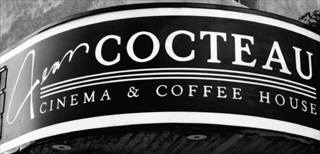
- 22 October 2000
- Jacques Cousteau Theatre
- I declined Seth’s offer to see “a really good film” at the Jacques Cousteau Theatre here in Santa Fe. I can only tolerate a male French accent for so long before it starts to sound like a parody of a French accent. That goes for everything from the wretched “Pink Panther” films to “zee mee-stayar-eez of zee deep.”
“Suit yourself,” Seth said, “but I thought it was the was the sort of film you enjoyed.”
“It has to be sharks, marine mammals, or turtles,” I replied, “which one is it?”
“I think it’s a film by Diane Keaton,” Seth informed me.
“In that case, I accept,” I said. “I’ve only seen one film by her, and it’s one of the few pieces of cinema that I’d describe as art.”
We cruised downtown, and parked in front of the Jean Cocteau Cinema. (Easy parking is one of Santa Fe’s most attractive attractions.)
“Seth,” I asked, “is this the Jacques Cousteau Theatre?”
Seth nodded.
“It says Jean Cocteau Cinema on the marquee,” I corrected.
“I suppose so, but who’s ever heard of her?” Seth shrugged.
Diane Keaton was delightful, as usual.

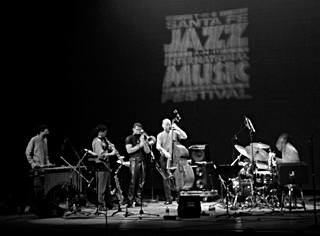
- 23 October 2000
- All That Jazz
- In the last three weeks, I’ve photographed dozens of musicians in twelve nights of performances. I figure that I’ve made some fifteen hundred exposures with my fancy and ridiculously complex new digital camera and with my old Leica.
Based on my recent experiences, as well as ancient memories of photographing rock concerts in the 1970s, I know that all my photographs have one thing in common: they’re not very good. Here’s why.
Although I love chance and frequently integrate it into my work, there’s also a lot to be said for control, of which I had none. I was using someone else’s lighting, someone else’s stage presentation, et cetera. Then, I had to photograph the musicians with a telephoto lens through a forest of booms, mountains of sound equipment, microphone stands, et cetera.
I had to photograph musicians who, understandably, were concentrating on the music rather than their appearance. (Perhaps that’s why a famous guitarist spent almost all of his performance with his back to the audience.)
And then there were the dreaded baseball caps, which did exactly what they were designed to do, i.e., keep the face out of the light. Lovely images there.
And then there were the hunchbacked musicians—pianists in particular—who never looked up. I’m still undecided whether in such situations a shiny skull or a mop of hair is preferable, but at least I have lots of photographs of each to compare.
In practice, all my photographs look more or less like the one of the (spectacularly brilliant) Dave Holland Quintet. I found a location where none of the musicians were obscured, then pushed the button when I could finally see everyone’s face. Boring, especially when compared to the extraordinary musicianship.
Since there’s no art, I shall have to rely on artifice. After I develop the film, I’ll feed everything into the computer, push the pixels around, and spit out something digestible. Or at least something that’s not too distasteful.

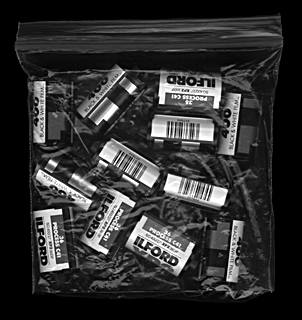
- 24 October 2000
- Four and a Half Gigabytes of Film
- I’m looking at the dozens of rolls of film I exposed in Santa Fe, and they look strangely primitive. Right now, the latent images consist of tiny bits of silver suspended in gelatin, a bovine byproduct. That’s not a problem, though; that’s the way photographs have been generally made for the last century or so.
Photography hasn’t changed, but I have. Right now, I don’t see a bag of film, I see a bag of data—four and a half gigabytes of it. And since the thirty-two gigabytes of data in my portable computer are stored in a hard drive smaller than a pack of cigarettes, a lumpy bag of metal canisters seems like a crude way to transport and store data.
I’m sure there’s a point to these observations, but I can’t figure out what it is.


